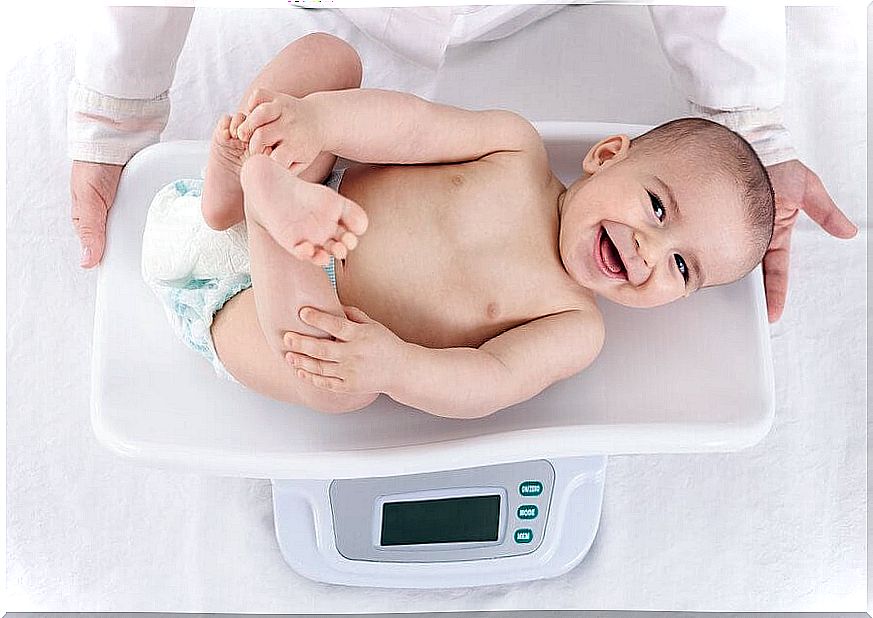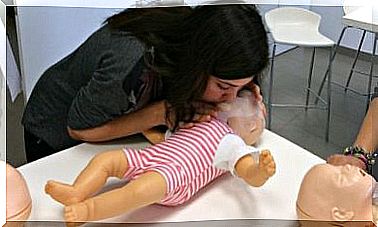Weight Gain In Babies During The First Year Of Life

The weight gain in babies and their growth during the first year of life is, without a doubt, incredible. At birth, the little ones weigh 3 kilos on average. However, when they reach 12 months, they reach 10 or 11 kilos.
During this period, children are going through many physical changes. Although their development is practically beginning, it will be a stage in which we will notice how their weight and height vary rapidly.
Taking that into consideration, we’ll detail five main points below with all the information you should know month by month about your little one’s weight.
With this in hand, you will be able to better monitor if the foods the baby received and their general health are within the parameters recommended by pediatricians.
Weight gain in babies month to month
The moment of maximum human growth is that which occurs between the four months and the first year of life. From the time the child is born until the age of twelve months, his weight will triple.
However, there are month-to-month variations and a fixed pattern is not followed. In fact, in a few months, your baby can lose weight instead of gaining. This is perfectly normal.
Therefore, it is very useful to illustrate in groups what happens to babies’ weight. This way, you will be able to have a more precise idea about its evolution.

Weight gain in babies during the first week of life
During the first days of life, the baby does not increase, but decreases in weight. This occurs in approximately 10% of what is registered on the scale. Some parents may be frightened by this fact, but it is actually a completely normal situation.
This is for two reasons: first, because of the elimination of urine and meconium, the baby’s first excrement, which accumulated in your body during pregnancy; second, newborns’ stomachs measure only about 5 centimeters ; therefore, the amounts of food he eats are reduced.
The baby’s birth weight will recover on the 15th day after birth. From there, it will increase progressively.
What happens in the first month?
During the child’s first month of life, their weight gain is estimated at 20 grams per day. This is because the baby’s stomach gradually expands as it feeds more, which in turn is linked to increased breast milk production.
The weekly grams increase between the second and fifth month
From the second month of life, the baby registers a weekly weight gain calculated at about 130 grams. Something like 20 or 15 grams a day, or about 600 grams a month.
This phase is very important because your diet is provided exclusively by breast milk or, failing that, artificial breastfeeding.
The sixth month has started and the baby starts to accumulate fat
The sixth month of a baby’s life can be one of the most beautiful in terms of physical appearance. In part, this is because, from the fifth month onwards, the child starts adding calories. In the sixth month, it reaches its maximum fat percentage.
Again, this is completely normal and refers to a child who has been fed correctly in response to their needs.
It is at this point that the child begins to receive new foods that complement their diet. As for your weight, it is estimated that you gain 500 grams per month until you are nine months old.

Weight gain in babies between nine months and their first birthday party
Almost as if preparing for a picture of his first birthday , the baby naturally reduces his weight gain.
This will be the stage where the child will gain the fewest grams, specifically between 200 and 250 grams per month. However, you will have already completed one stage successfully, and your weight, compared to your first few days, will have tripled.
Finally, remember that good nutrition, good rest, and all the love you have to give your baby will be key factors in her growth.
If you notice that something exceeds normal parameters or affects your child’s well-being, do not hesitate to consult your pediatrician.








